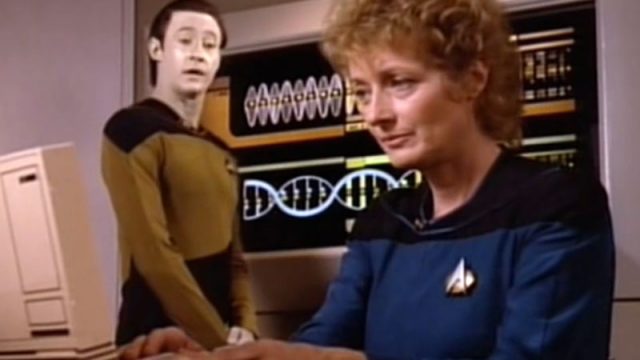Star Trek was historically not a great place for women. Mostly they were on the original series to be leered at; it’s why Uhura was so special—not just a woman but a black woman who was treated with respect and shown to be competent. And then much as you might like Yeoman Rand, it remains true that she didn’t get much to do, and Nurse Chapel was mostly just there to drool over Spock. This mean that both Diana Muldaur’s arrival and her departure from Star Trek: The Next Generation were seen as signs that the show hadn’t resolved its issues that way.
Despite her Wikipedia page’s assertion that she had film stardom enough to merit its own section, Muldaur has long been primarily a TV actress. Now, there’s nothing wrong with that. There are plenty of talented people who have made their homes on television over the decades. And it is true that Muldaur was in some critically acclaimed movies for a spell, though her entire film list is ten movies, one still in production. Still, she’s definitely one of those people whose career hit a lot of the TV Career Shows over the decades.
There are a lot of notable shows in her career, but probably the most important of the relatively early ones is the two episodes of the original Star Trek she made. She didn’t keep in contact with Gene Roddenberry, she says, but it seems he remembered her. Dr. Katherine Pulaski had a very different vibe, being a lot more in the Bones tradition than the gentle, maternal Dr. Crusher she replaced. Lots of people didn’t like her for that, and it seems that’s why she was only on one season. It also seems it wasn’t a great experience for her, though she likes the fans quite a lot.
Oh, it seems to me that her Wikipedia page is one of those written by a publicist or something, but it’s true that the recurring characters she played on seven different TV shows in her career, even if I’ve never heard of one of them outside this context, is worth noting at least as much as her “movie stardom.” There’s something about Muldaur that makes her a good fit for a recurring character. She manages to be compassionate and determined in the same reaction, and that’s no easy task.
Honestly, I liked Dr. Pulaski. Her attitude toward Data did annoy me—the response to someone telling you how to pronounce their name is not to ask why they care—but by and large, she was an interesting character. Even if she wasn’t a good fit for that particular crew, it was easy to see her as someone who was a successful doctor. After all, she very much reminded me of Bones, who was a good fit for his own crew. Probably that was the intention for her, after all.
I have to be my own publicist and ask you to support my Patreon or Ko-fi!

